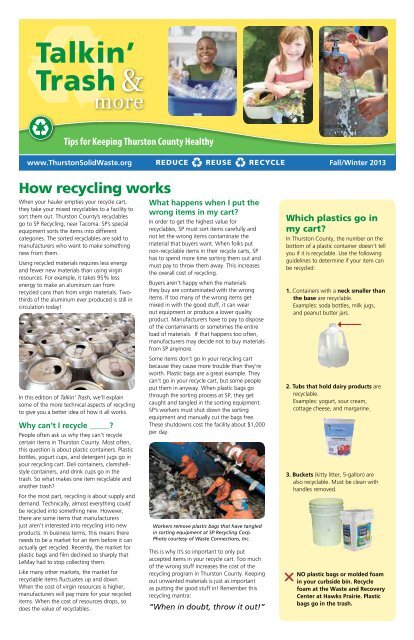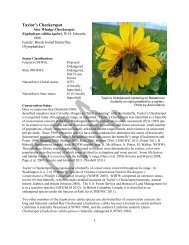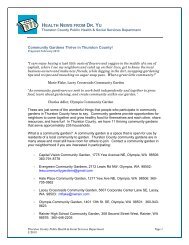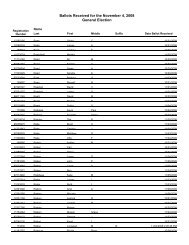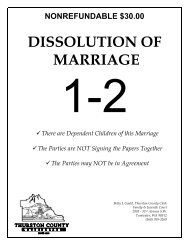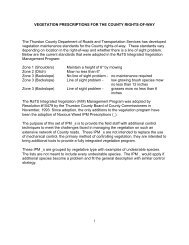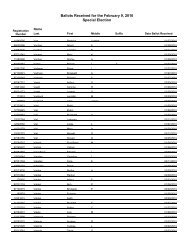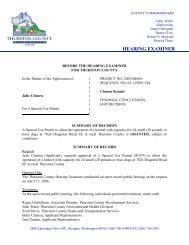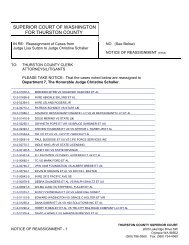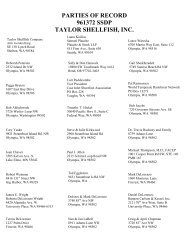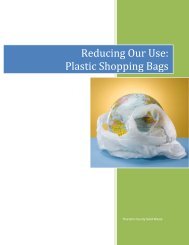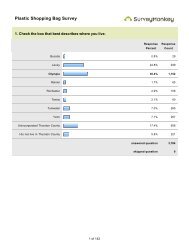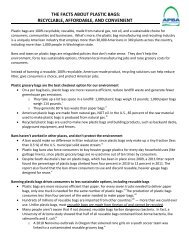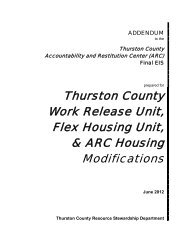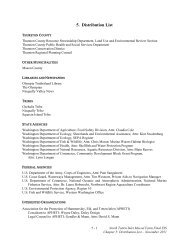Fall 2013 Talkin' Trash - Thurston County
Fall 2013 Talkin' Trash - Thurston County
Fall 2013 Talkin' Trash - Thurston County
You also want an ePaper? Increase the reach of your titles
YUMPU automatically turns print PDFs into web optimized ePapers that Google loves.
Talkin’<br />
<strong>Trash</strong><br />
&<br />
more<br />
Tips for Keeping <strong>Thurston</strong> <strong>County</strong> Healthy<br />
www.<strong>Thurston</strong>SolidWaste.org<br />
How recycling works<br />
When your hauler empties your recycle cart,<br />
they take your mixed recyclables to a facility to<br />
sort them out. <strong>Thurston</strong> <strong>County</strong>’s recyclables<br />
go to SP Recycling, near Tacoma. SP’s special<br />
equipment sorts the items into different<br />
categories. The sorted recyclables are sold to<br />
manufacturers who want to make something<br />
new from them.<br />
Using recycled materials requires less energy<br />
and fewer new materials than using virgin<br />
resources. For example, it takes 95% less<br />
energy to make an aluminum can from<br />
recycled cans than from virgin materials. Twothirds<br />
of the aluminum ever produced is still in<br />
circulation today!<br />
In this edition of Talkin’ <strong>Trash</strong>, we’ll explain<br />
some of the more technical aspects of recycling<br />
to give you a better idea of how it all works.<br />
Why can’t I recycle _____?<br />
People often ask us why they can’t recycle<br />
certain items in <strong>Thurston</strong> <strong>County</strong>. Most often,<br />
this question is about plastic containers. Plastic<br />
bottles, yogurt cups, and detergent jugs go in<br />
your recycling cart. Deli containers, clamshellstyle<br />
containers, and drink cups go in the<br />
trash. So what makes one item recyclable and<br />
another trash?<br />
For the most part, recycling is about supply and<br />
demand. Technically, almost everything could<br />
be recycled into something new. However,<br />
there are some items that manufacturers<br />
just aren’t interested into recycling into new<br />
products. In business terms, this means there<br />
needs to be a market for an item before it can<br />
actually get recycled. Recently, the market for<br />
plastic bags and film declined so sharply that<br />
LeMay had to stop collecting them.<br />
Like many other markets, the market for<br />
recyclable items fluctuates up and down.<br />
When the cost of virgin resources is higher,<br />
manufacturers will pay more for your recycled<br />
items. When the cost of resources drops, so<br />
does the value of recyclables.<br />
What happens when I put the<br />
wrong items in my cart?<br />
In order to get the highest value for<br />
recyclables, SP must sort items carefully and<br />
not let the wrong items contaminate the<br />
material that buyers want. When folks put<br />
non-recyclable items in their recycle carts, SP<br />
has to spend more time sorting them out and<br />
must pay to throw them away. This increases<br />
the overall cost of recycling.<br />
Buyers aren’t happy when the materials<br />
they buy are contaminated with the wrong<br />
items. If too many of the wrong items get<br />
mixed in with the good stuff, it can wear<br />
out equipment or produce a lower quality<br />
product. Manufacturers have to pay to dispose<br />
of the contaminants or sometimes the entire<br />
load of materials. If that happens too often,<br />
manufacturers may decide not to buy materials<br />
from SP anymore.<br />
Some items don’t go in your recycling cart<br />
because they cause more trouble than they’re<br />
worth. Plastic bags are a great example. They<br />
can’t go in your recycle cart, but some people<br />
put them in anyway. When plastic bags go<br />
through the sorting process at SP, they get<br />
caught and tangled in the sorting equipment.<br />
SP’s workers must shut down the sorting<br />
equipment and manually cut the bags free.<br />
These shutdowns cost the facility about $1,000<br />
per day.<br />
Workers remove plastic bags that have tangled<br />
in sorting equipment at SP Recycling Corp.<br />
Photo courtesy of Waste Connections, Inc.<br />
This is why it’s so important to only put<br />
accepted items in your recycle cart. Too much<br />
of the wrong stuff increases the cost of the<br />
recycling program in <strong>Thurston</strong> <strong>County</strong>. Keeping<br />
out unwanted materials is just as important<br />
as putting the good stuff in! Remember this<br />
recycling mantra:<br />
“When in doubt, throw it out!”<br />
Summer/Spring <strong>Fall</strong>/Winter <strong>2013</strong> 2011<br />
Which plastics go in<br />
my cart?<br />
In <strong>Thurston</strong> <strong>County</strong>, the number on the<br />
bottom of a plastic container doesn’t tell<br />
you if it is recyclable. Use the following<br />
guidelines to determine if your item can<br />
be recycled:<br />
1. Containers with a neck smaller than<br />
the base are recyclable.<br />
Examples: soda bottles, milk jugs,<br />
and peanut butter jars.<br />
2. Tubs that hold dairy products are<br />
recyclable.<br />
Examples: yogurt, sour cream,<br />
cottage cheese, and margarine.<br />
3. Buckets (kitty litter, 5-gallon) are<br />
also recyclable. Must be clean with<br />
handles removed.<br />
NO plastic bags or molded foam<br />
in your curbside bin. Recycle<br />
foam at the Waste and Recovery<br />
Center at Hawks Prairie. Plastic<br />
bags go in the trash.
2<br />
Quick<br />
updates<br />
Help us improve signs<br />
at the WARC<br />
Over the next few months, Solid Waste<br />
educators and<br />
other county staff<br />
will discuss ways<br />
to improve the<br />
signs at the Waste<br />
and Recovery<br />
Center (WARC).<br />
Our goal is to help<br />
our users - you<br />
- navigate more<br />
easily throughout<br />
the site.<br />
We need your<br />
input! If you visit the WARC and notice<br />
specific areas where the signs are<br />
unclear, please let us know!<br />
Email <strong>Thurston</strong>SolidWaste@<br />
co.thurston.wa.us or call 867-2281.<br />
Help us update<br />
WhereDoITakeMy.org<br />
Our database provides locations to take<br />
over 180 different items for reuse or<br />
recycling. We get our best information<br />
from you, the community.<br />
If you know of a local business or<br />
organization that accepts items but you<br />
don’t see it listed, please let us know!<br />
Send your information to Loni Hanka<br />
at hankal@co.thurston.wa.us or call<br />
867-2282.<br />
Changes to green<br />
business program<br />
It’s easier than ever to apply for the<br />
<strong>Thurston</strong> Green Business program.<br />
Now there is no application fee! Learn<br />
more or apply now at<br />
www.thurstongreenbusiness.com.<br />
New compost<br />
collection route<br />
coming<br />
LeMay is creating a new food and yard<br />
waste collection route for residents in<br />
the Lake Lawrence and Scenic Shores<br />
areas. For questions, call LeMay at<br />
923-0111.<br />
Plastic film recycling collection ends<br />
Last month, LeMay discontinued its plastic<br />
film recycling service. Until then, LeMay<br />
had collected plastic film from several local<br />
businesses as well as the plastic film drop<br />
box at the Waste and Recovery Center. The<br />
program included plastic bags, pallet wrap,<br />
and plastic strapping.<br />
LeMay’s decision to end the program was<br />
based on lack of markets for mixed plastic film.<br />
Recycling is a business - it takes equipment<br />
and staffing to collect recyclable materials.<br />
If nobody will buy the plastic film, there’s no<br />
money to collect it.<br />
Commercial customers and drop box users<br />
generate more than 15 tons of plastic film<br />
each month - around 187 tons each year!<br />
Right now, several tons of plastic film still sit<br />
unsold in a LeMay warehouse.<br />
It’s unfortunate to see the program go, but<br />
it’s important to remember that recycling isn’t<br />
a magic cure for waste. Recycling only works<br />
when someone wants to create a new<br />
product from old materials. That’s<br />
why it’s so important to make careful<br />
choices when buying items in the first<br />
place. You can help prevent waste by<br />
choosing reusable items and only buying<br />
something if you really need it.<br />
Can I put plastic bags and other<br />
film in my SingleStream recycle cart<br />
instead?<br />
No. Plastic bags and film tangle in<br />
equipment at the sorting facility. They<br />
do NOT go in your recycle cart.<br />
Learn more<br />
Can I still recycle plastic bags at my local<br />
grocery store?<br />
Check with the store. Some grocery stores<br />
may still collect bags if they have found<br />
another recycler. Check with the store<br />
manager to make sure the bags actually get<br />
recycled.<br />
Can I put plastic film in any of the drop<br />
boxes at the Waste and Recovery Center?<br />
No. You can’t mix plastic film with plastic<br />
containers in any of the drop boxes.<br />
What should I do with my plastic grocery<br />
bags now?<br />
If you can’t think of some way to reuse them<br />
(many folks use them to line smaller trash cans<br />
or to pick up dog poop), they go in the trash.<br />
Next time you shop, bring your reusable<br />
shopping bags. Remembering your bags is like<br />
any other habit - it takes time and practice.<br />
What should I do with paper grocery bags? Take your clean, dry paper bags to the<br />
<strong>Thurston</strong> <strong>County</strong> Food Bank. Food bank staff and volunteers use them to distribute food to<br />
clients. The food bank is located at 220 <strong>Thurston</strong> Avenue NE in Olympia.<br />
What’s in a number?<br />
A yogurt container and a plastic drink cup<br />
both have the number “5” on the bottom. The<br />
yogurt cup goes in your curbside recycle cart,<br />
so that means the drink cup can go in too,<br />
right?<br />
Wrong. Then what do the numbers mean?<br />
This is one of the trickiest recycling issues.<br />
Although two plastic items may share<br />
the same number on the bottom, that<br />
doesn’t mean they<br />
are equally recyclable<br />
in <strong>Thurston</strong> <strong>County</strong>.<br />
That number -<br />
called the Resin<br />
Identification Code<br />
(RIC) - indicates the<br />
type of plastic resin<br />
used to make the<br />
item. But each resin type isn’t an<br />
exact formula; it’s more of a group<br />
of related types of plastic. Manufacturers add<br />
different chemicals to the same base resin to<br />
produce different kinds of products. So even<br />
though cups, bags, and trays have the same<br />
RIC on the bottom, each item may be made<br />
from a different grade of that resin.<br />
Items made from different resin grades cool<br />
and melt at different temperatures. This<br />
creates a gloppy mess when recyclers try to<br />
make new products out of the recovered<br />
plastic. As a result, plastic of mixed resin<br />
grades can only be recycled into lower-grade<br />
products, like plastic railroad ties and park<br />
benches. Recycling processors<br />
must keep the resin grades<br />
separate in order to turn<br />
recycled items back into new<br />
plastic bottles and tubs.<br />
To add confusion, the “chasing<br />
arrows” icon that circles the<br />
number doesn’t mean the<br />
container can be recycled or that<br />
it is made from recycled materials.<br />
What does this mean for your<br />
curbside recycle cart? Forget the<br />
numbers. Instead, recycle items by shape:<br />
• Bottles, jugs, and jars (have a neck smaller<br />
than the base).<br />
• Dairy tubs (like yogurt, sour cream, and<br />
margarine containers).<br />
• 5-gallon and kitty litter buckets.
Since you asked!<br />
When we’re out and about in the community,<br />
we often talk to folks who proudly consider<br />
themselves the “recycle police” at home.<br />
These super recyclers remove every bit of the<br />
label from a can or clean plastic bottles in the<br />
dishwasher.<br />
We love that these folks go the extra mile, but<br />
don’t worry if you prefer a simpler recycling<br />
routine. Here are some frequently asked<br />
questions about preparing your recyclables:<br />
Q. Do I need to remove labels from bottles,<br />
jars, or cans?<br />
A. No. You can leave the labels on cans as well<br />
as plastic and glass bottles and jars.<br />
Q. Should I remove the clear plastic windows<br />
from envelopes and food boxes?<br />
A. No. You can leave the little plastic windows<br />
on.<br />
Q. Do I need to remove staples or the metal<br />
binding on spiral notebooks?<br />
A. No. Recycling equipment can remove<br />
staples and metal spirals. You DO need to<br />
remove plastic binding from notebooks.<br />
Q. Do I need to remove the clear plastic sleeves<br />
that newspapers and magazines sometimes<br />
come in?<br />
A. Yes. You must remove the plastic sleeve<br />
before recycling paper. Plastic bags of any type<br />
DON’T go in your curbside recycle cart.<br />
Q. Should I flatten cans?<br />
A. No. Flattening cans was a requirement<br />
back in the early days of recycling. Today, the<br />
processing plant that processes our recyclables<br />
needs the cans unflattened. This helps the<br />
sorting equipment easily identify them.<br />
Q. How well should I rinse containers? Do they<br />
need to be squeaky clean?<br />
A. Remove any food from your containers,<br />
and give them a quick rinse if there is any food<br />
residue left inside. You certainly don’t need to<br />
send your containers through the dishwasher.<br />
Q. Do I need to remove the plastic spout from<br />
a half-gallon size milk or juice carton?<br />
A. No. You can leave the plastic spout, but<br />
throw the lid in the trash.<br />
Q. Should I remove the little metal or plastic<br />
rings from the necks of bottles and jars?<br />
A. No. You can leave the rings on bottles and<br />
jars. This is true for plastic and glass containers.<br />
Q. Should I remove the<br />
plastic handle from a<br />
metal pot or pan?<br />
A. No. You can leave<br />
the handle on. It will<br />
burn off when the<br />
metals melt down.<br />
Q. Can I put<br />
my recyclables<br />
in a plastic<br />
bag inside my<br />
cart?<br />
A. No. Put all items<br />
loose in your cart.<br />
The trouble with recycling lids and caps<br />
We’re often asked why plastic caps and lids<br />
aren’t recyclable in <strong>Thurston</strong> <strong>County</strong>. If the<br />
container is recyclable, why not the top?<br />
1<br />
2<br />
Learn more<br />
Got a recycling question? Email <strong>Thurston</strong>SolidWaste@co.thurston.wa.us or call 867-2491.<br />
Caps are often made out of a different type<br />
of plastic than bottles and other containers.<br />
Workers at the sorting facility don’t have<br />
time to take caps and lids off of bottles.<br />
Different types of plastics can’t be recycled<br />
together, so caps and lids will contaminate<br />
other recyclables.<br />
Lids of all sizes are a problem at sorting<br />
centers. Small lids can jam the equipment.<br />
Dairy tub lids are larger, but they’re also<br />
flatter. The automated sorting equipment<br />
can’t separate them from paper and<br />
cardboard.<br />
3<br />
4<br />
Caps left on bottles can become projectiles<br />
when the bottles are compacted, which<br />
poses a danger to workers.<br />
Lids and caps can trap liquids inside<br />
containers. To be recycled properly,<br />
containers must be empty.<br />
What should I do with lids? Throw all plastic<br />
lids in the trash. This includes plastic bottle<br />
caps and plastic lids from dairy tubs (such as<br />
yogurt and margarine containers).<br />
If you can’t stomach throwing lids away, find a<br />
creative way to reuse them. Some people reuse<br />
the flat plastic lids by placing them under sticky<br />
bottles in cupboards or under flower pots.<br />
What about metal lids? You can recycle a<br />
metal lid only if the lid is still attached to the<br />
can (and folded into the can itself). If the lid is<br />
not attached, put it in the bottom of the can<br />
and squeeze the opening slightly to prevent<br />
it from falling out. Loose lids accidently get<br />
mixed in with paper and cardboard during the<br />
sorting process and pose a hazard to sorting<br />
staff.<br />
Local governments say<br />
NO to plastic bags<br />
Olympia, Tumwater, and<br />
unincorporated <strong>Thurston</strong> <strong>County</strong> have<br />
passed ordinances that ban stores from<br />
giving out plastic carryout bags. The<br />
ordinance goes into effect July 1, 2014.<br />
The ban only applies to bags that<br />
stores put your items into at checkout.<br />
Plastic bags NOT included in the ban<br />
include:<br />
• Bags used for bulk items, produce, or<br />
meat.<br />
• Dry cleaning bags.<br />
• To-go bags for prepared food.<br />
• Newspaper bags.<br />
• Any bags sold in packages.<br />
Stores can choose to give customers<br />
paper bags, but must charge at least<br />
5 cents per bag. Paper bags subject<br />
to the fee are standard grocery store<br />
size or larger. They must be 40 percent<br />
recycled content - usually this is printed<br />
on the bag. There is no fee for smaller<br />
paper bags and paper bags customers<br />
use before they get to checkout - like<br />
paper bakery or produce bags.<br />
Paper bags will be free for customers<br />
paying for food with an Electronic<br />
Benefit Transfer card (food stamps) or<br />
other food assistance program. Food<br />
banks and food assistance programs<br />
can still use plastic bags to distribute<br />
food. Reusable bag giveaways will<br />
focus on these audiences.<br />
Stores will use the paper bag fee to<br />
offset the higher cost of paper bags. It<br />
also acts as an incentive for the public<br />
to bring their reusable bags, which<br />
have a much lower environmental<br />
impact than disposable bags.<br />
A stakeholders group of local residents<br />
and businesses developed the draft<br />
ordinance language. The group<br />
provided the draft ordinance to all<br />
city councils and the <strong>Thurston</strong> <strong>County</strong><br />
Board of Commissioners. Each of the<br />
remaining cities has the choice to<br />
adopt the ordinance. If all jurisdictions<br />
adopt the ordinance, it will provide a<br />
level playing field for businesses and<br />
create consistency for shoppers.<br />
These actions come after a twoyear<br />
process of working with the<br />
community to find ways to reduce the<br />
use of disposable shopping bags. Faced<br />
with declining markets for recyclables,<br />
LeMay had to stop collecting plastic<br />
bag and plastic film last month. Lack of<br />
recycling options just emphasizes the<br />
need for alternatives.<br />
The bag ordinance doesn’t go into<br />
effect until July 2014. This gives Solid<br />
Waste time to inform residents and<br />
businesses. It also gives the community<br />
time to adjust before the holiday<br />
shopping season, which minimizes the<br />
impact on businesses.<br />
Learn more, read the draft ordinance<br />
language, or sign up for email alerts at<br />
www.<strong>Thurston</strong>SolidWaste.org/Plastics.<br />
3
Waste sort at the<br />
Waste and Recovery<br />
Center<br />
Every five years, <strong>Thurston</strong> <strong>County</strong> Solid<br />
Waste hires a company to sort through<br />
samples of the county's garbage when<br />
it arrives at the Waste and Recovery<br />
Center. Waste sort workers separate<br />
the waste into nearly 90 categories<br />
including yard debris, food, textiles,<br />
and metals.<br />
The results help Solid Waste educators<br />
understand what businesses and<br />
residents are throwing away and how<br />
to develop programs to help reduce<br />
waste. We can also compare data from<br />
previous waste sorts to see how our<br />
waste stream has changed over time.<br />
The waste sorts don’t just look at the<br />
county's waste stream in general.<br />
They also collect individualized data<br />
about waste from City of Olympia<br />
residents and businesses, and waste<br />
that <strong>Thurston</strong> <strong>County</strong> government<br />
employees generate.<br />
Green Solutions, an environmental<br />
consulting firm, will conduct four<br />
waste sorts between October <strong>2013</strong> and<br />
July 2014. The waste sorts are spread<br />
out quarterly to capture changes in the<br />
waste stream at different times of year.<br />
Once all four waste sorts are complete,<br />
we will post the results online. Visit<br />
www.<strong>Thurston</strong>SolidWaste.org and click<br />
“Regulations, Plans, Studies” to see<br />
results from previous waste sorts.<br />
Waste sorts for schools<br />
and businesses<br />
Wish you had data about what’s in<br />
your organization’s trash? We can<br />
help! Solid Waste staff can help<br />
your business, school, non-profit, or<br />
government agency conduct a waste<br />
sort at your facility.<br />
Visit www.<strong>Thurston</strong>SolidWaste.org or<br />
call 867-2491 to learn more.<br />
Give waste-free gifts this holiday season<br />
As the holidays approach and crowded<br />
shopping trips loom in your future, consider a<br />
creative, low-stress and waste-free approach<br />
to gift giving. Between Thanksgiving and New<br />
Year’s Day, Americans throw away 25 percent<br />
more trash.<br />
How can you minimize your impact this holiday<br />
season? Try these waste-free gift ideas!<br />
Give the gift of experience.<br />
• Plan a day trip to the Nisqually National<br />
Wildlife Refuge or bike the Yelm-Tenino or<br />
Chehalis-Western trail. Pack a picnic lunch to<br />
add to the fun.<br />
• Take a walk on the wild side. Visit the<br />
rescued animals at Wolf Haven<br />
in Tenino or head to Northwest<br />
Trek, Olympic Game Farm, or<br />
Point Defiance Zoo & Aquarium.<br />
• Spend an evening at the<br />
theater. Harlequin<br />
Productions and the<br />
Washington Center<br />
for Performing Arts<br />
in Downtown Olympia<br />
are just two local<br />
opportunities to watch<br />
live performances.<br />
• Give tickets to a sporting event<br />
or treat someone to a day at a<br />
museum.<br />
• Buy lessons for a new sport<br />
or hobby like rock climbing,<br />
kayaking, or painting.<br />
Donate to a worthy cause.<br />
• Donate locally to an organization<br />
such as the <strong>Thurston</strong> <strong>County</strong> Food<br />
Bank.<br />
• Help a family in need by donating to an<br />
international relief organization. For example,<br />
Heifer International uses your donation to<br />
purchase a farm animal, seeds, or clean<br />
water for people in developing countries.<br />
Learn more<br />
Check out more holiday resources online. Visit www.<strong>Thurston</strong>SolidWaste.org/Holiday to<br />
find where to recycle holiday-related waste, learn how to care for a live tree, and get tips for<br />
throwing a waste-free holiday party.<br />
City of Olympia news:<br />
Give a waste-free gift certificate for the holidays<br />
One of the best gifts you can give is the gift<br />
of your time. A custom certificate giving time<br />
through an experience or showcasing your<br />
talent or skills is a great gift. Find PDFs of five<br />
customizable certificate designs at<br />
www.olympiawa.gov/zerowaste.<br />
You can download a PDF template,<br />
choose a background photo, and<br />
add custom text to the appropriate<br />
fields. The possibilities are endless!<br />
Simply print the certificate and put<br />
it in an envelope. A few ideas are<br />
listed below, but you'll find many<br />
more on the city's website.<br />
• “Adopt” an endangered animal from an<br />
organization like The World Wildlife Fund.<br />
The symbolic adoption helps support the<br />
effort to protect wild animals and habitat.<br />
Go homemade.<br />
• Put homemade cookies and treats in reusable<br />
tins or plates. Bake a cake or pie and include<br />
the pan as a gift.<br />
• Create a cookbook with favorite recipes.<br />
Prepare a sampling of treats to go along with<br />
it.<br />
• Make soaps, candles, framed photos,<br />
ornaments, or other crafts.<br />
• Give coupons for a service<br />
you can do, such as a home<br />
repair or washing a car.<br />
Choose recycled or<br />
reusable gifts.<br />
• Re-gift something<br />
meaningful that you no<br />
longer use, such as a<br />
well-loved book.<br />
• Shop at thrift stores or<br />
estate sales for that hidden<br />
treasure of jewelry, books, or<br />
dress-up clothes for kids.<br />
• Give a travel mug, durable water<br />
bottle, new lunchbox, or cloth<br />
produce and sandwich bags.<br />
If you do plan to buy new gifts . . .<br />
• Choose items with recycled content<br />
and less packaging.<br />
• Pick durable, well-made items<br />
that won’t be headed for the<br />
landfill in a month’s time.<br />
• Choose items that get used up<br />
or eaten, such as specialty foods or<br />
artisan candles and soaps.<br />
• Give practical items, such as seeds for a<br />
gardener or fabric and thread for the sewing<br />
enthusiast.<br />
Certificate ideas:<br />
• Share a talent and give a lesson.<br />
• Bake some bread or cookies.<br />
• Take a loved one out on the town.<br />
• Offer a trip to the museum or zoo.<br />
• Offer yard work, house repairs, or babysitting.<br />
4
Program saves nearly 100,000 lbs of food!<br />
Over the past year and half, the Restaurant<br />
Rescue program has prevented prepared,<br />
unserved food from going to waste. The<br />
<strong>Thurston</strong> <strong>County</strong> Food Bank has been turning<br />
extra food from restaurants into delicious and<br />
nutritious meals for its clients.<br />
The food bank’s new refrigerated van keeps<br />
donated food at the proper temperatures<br />
during transport. Food bank volunteers take<br />
bulk-sized donations and repackage them into<br />
individual portions in the newly renovated<br />
kitchen.<br />
During its first year, Restaurant Rescue<br />
recovered a whopping 21,867 pounds of<br />
prepared foods from restaurants in <strong>Thurston</strong><br />
<strong>County</strong>! The program also rescued over<br />
75,000 pounds from World Class Distributing,<br />
the distributor for Trader Joe’s stores.<br />
In addition to local restaurants, school districts<br />
have expressed interest in donating extra<br />
food prepared for school lunches. To ensure<br />
there is enough food for every student, school<br />
kitchens sometimes prepare food that doesn’t<br />
get served. U.S. Department of Agriculture<br />
guidelines prevent a lot of this food from being<br />
Learn more<br />
Your restaurant or school can help members of our community and prevent wasted food too!<br />
It’s easy - restaurants interested in joining can contact <strong>Thurston</strong> <strong>County</strong> Food Bank Director<br />
Robert Coit at 352-8597. Schools wanting more information should contact Peter Guttchen<br />
at guttchp@co.thurston.wa.us or 867-2283.<br />
Local business spotlight:<br />
Holy Lamb Organics strives for zero waste<br />
Holy Lamb Organics is a small, local business<br />
that makes natural bedding products including<br />
mattresses, pillows, and comforters. Owner<br />
Willow Whitton is proud to say her business<br />
creates little if any waste.<br />
So how does a business approach zero waste?<br />
Holy Lamb reuses, recycles, or composts almost<br />
all manufacturing by-products and sends<br />
almost nothing to the landfill. With some<br />
thoughtful planning, Whitton has incorporated<br />
a variety of creative solutions to get rid of<br />
waste. For example, the smallest scraps of<br />
thread, wool, and fabric are upcycled into<br />
small products in Holy Lamb’s new ReKindle<br />
product line. Anything too small to use is<br />
composted using a vermiculture (worm)<br />
composting system or used as the bottom layer<br />
for paths in the community garden.<br />
Holy Lamb Organics uses only organic cotton<br />
fabric and top-of-the-line wool grown by small<br />
U.S. sheep farmers. The manufacturing site<br />
is chemical and scent-free, and Holy Lamb<br />
used green building practices to restore the<br />
old general store that houses its showroom<br />
and manufacturing site. Holy Lamb also uses<br />
waste-free packaging to ship finished goods to<br />
customers. Whitton feels she has an obligation<br />
to educate her customers about why and how<br />
Holy Lamb Organics incorporates zero waste<br />
practices into everything it does.<br />
Besides providing 14 green jobs to a<br />
rural town, Holy Lamb pays employees a<br />
competitive wage plus benefits. Employees<br />
also have the opportunity to participate in a<br />
reheated or served to students on another day.<br />
As a result, a lot of good food goes to waste.<br />
Last May, Olympia High School became the<br />
first school in <strong>Thurston</strong> <strong>County</strong> to join the<br />
program by running a pilot to collect extra<br />
food prepared for lunches. The pilot was so<br />
successful that the program has expanded<br />
to include all 18 Olympia schools this fall. As<br />
this issue goes to press, Olympia schools have<br />
rescued 1,000 pounds of food this school year!<br />
The food bank is making creative use of the<br />
food they’re collecting from schools. For<br />
example, they cut up school hotdogs and<br />
combine them with beans rescued from a local<br />
restaurant to create a ready-to-eat meal.<br />
green commuting program and to work in the<br />
community organic garden.<br />
Whitton came up with the idea for Holy Lamb<br />
Organics while on a backpacking trip in the<br />
Redwoods. When forced to buy a completely<br />
synthetic backpacking pillow, Whitton<br />
discovered the need for an all-natural pillow<br />
option. By the time she returned home, she<br />
had a full business plan mapped out in her<br />
head. Eleven years later, Holy Lamb Organics<br />
is thriving and growing.<br />
Visit Holy Lamb Organics at 104 West Pine<br />
Street in downtown Oakville. The shop is open<br />
Monday through Friday from 9 a.m. to 5 p.m.<br />
Learn more about the business or check out<br />
the products at www.holylamborganics.com.<br />
Recycle your tree for<br />
free!<br />
Pickup options<br />
LeMay compost collection/yard<br />
waste customers: Put trees in or near<br />
your compost cart (in sections 3 feet or<br />
less). Call 923-0111 for info.<br />
City of Olympia garbage customers:<br />
For customers with Thurs./Fri. service,<br />
tree pickup is Sat., Jan. 4. For those<br />
with Tues./Wed. service, pickup is Sat.,<br />
Jan. 11. Place tree in regular pickup<br />
spot by 6 a.m. on your collection day.<br />
Call 753-8368 and choose option 2 for<br />
more info.<br />
City of Lacey residents: The City of<br />
Lacey and local boy scout troops are<br />
partnering to provide tree pickup inside<br />
city limits. For details, please visit<br />
www.ci.lacey.wa.us/treepickup or call<br />
Lacey Public Affairs at 491-3214.<br />
City of Tumwater residents: Place<br />
trees at the nearest street corner by 8<br />
a.m., Tues. Jan. 6. Call 754-4150 for<br />
more information.<br />
Drop-off locations<br />
All <strong>Thurston</strong> <strong>County</strong> residents:<br />
Take trees to the Waste and Recovery<br />
Center at 2418 Hogum Bay Road NE<br />
in Lacey from Dec. 26 to Jan. 12. Open<br />
weekdays 7 a.m. to 5 p.m. and Sat.<br />
and Sun., 8 a.m. to 5 p.m. Closed New<br />
Year’s Day.<br />
Rainier residents: Take trees to the<br />
drop box at 13010 Rainier Acres Road<br />
from Dec. 26 through Jan. 11. Open<br />
Fri, Sat., and Sun. 9 a.m. to 5 p.m.<br />
Rochester residents: Take trees to the<br />
drop box at 16500 Sargent Road from<br />
Dec. 26 through Jan. 12. Open Tues.,<br />
Sat., and Sun., 9 a.m. to 5 p.m.<br />
Tenino residents: Take trees to 418<br />
South Wichman Street S from Dec. 25<br />
through Jan. 15.<br />
Yelm residents: Take trees to Yelm<br />
City Park anytime from Dec. 26<br />
through Jan. 10.<br />
Residents near Shelton: Bill<br />
McTurnal Enterprises at 721 Kamilche<br />
Lane accepts trees from Dec. 28<br />
through Jan. 9 during daylight hours.<br />
Weekends, leave trees by closed gate.<br />
NO flocked trees. Please remove all<br />
ornaments, lights, tinsel,<br />
stands, and nails prior<br />
to recycling. Multifamily<br />
complex<br />
residents should<br />
check with<br />
their property<br />
manager<br />
for tree<br />
placement<br />
locations.<br />
5
Attention teachers:<br />
Check out these<br />
resources for your<br />
students!<br />
<strong>Trash</strong> Talk newsletter<br />
Like Talkin’ <strong>Trash</strong>? Now fourth and fifth<br />
grade students can get their own free<br />
<strong>Trash</strong> Talk publication! We’ll deliver a<br />
copy of the newsletter to each student<br />
in your class four times throughout<br />
the school year. <strong>Trash</strong> Talk features<br />
information on recycling, reuse,<br />
household hazardous waste, yard<br />
waste, waste reduction, and more. It<br />
also has activities like word searches,<br />
crossword puzzles, and other games to<br />
make learning more fun!<br />
Classroom presentations<br />
Solid Waste offers free, fun<br />
presentations for kindergarten<br />
through eighth grade students about<br />
recycling, worms and worm bins, waste<br />
reduction, and household hazardous<br />
products. To read a description of each<br />
presentation, visit<br />
www.<strong>Thurston</strong>SolidWaste.org/Youth.<br />
Youth opportunities<br />
Earn your RRR patch<br />
Kids can earn the Reduce, Reuse,<br />
Recycle patch from <strong>Thurston</strong> <strong>County</strong><br />
Solid Waste as a group activity or<br />
individually. The program is designed to<br />
teach youth the meaning of “reduce,<br />
reuse, recycle” by encouraging them<br />
to take better care of the environment<br />
and their neighborhoods. After<br />
completing activities and action<br />
projects, each group fills out a Patch<br />
Requirement Sheet. <strong>Thurston</strong> <strong>County</strong><br />
Solid Waste will then send each<br />
participant a free patch for practicing<br />
the 3 Rs. Download instructions at<br />
www.<strong>Thurston</strong>SolidWaste.org/Youth.<br />
Are your kids eating the lunches they<br />
bring to school?<br />
Schools throw away a lot of stuff, and a lot of<br />
that stuff is food. In fact, 65 percent by weight<br />
of a typical school’s garbage is uneaten food.<br />
Food to Flowers program staff spend a lot of<br />
time in school cafeterias and see a lot of food<br />
wasted at lunchtime. Imagine all of the great<br />
food that goes to waste - whole sandwiches,<br />
full yogurt cups, and tons of untouched fruit<br />
and vegetables!<br />
All of this uneaten food is part of a larger<br />
problem. The National Resource Defense<br />
Council estimates that we waste 40 percent<br />
of all edible food in the U.S. This means the<br />
average household wastes $1,350 to $2,275<br />
a year on uneaten food. When you toss out<br />
that food, you also waste all of the water and<br />
energy used to grow, transport, package, and<br />
landfill or compost it.<br />
As a new school year begins, here are some<br />
tips to help your family reduce lunch waste,<br />
conserve resources, and save money.<br />
Pack it in, pack it out. When your kids bring<br />
lunch from home, ask them to bring home<br />
any food they didn’t eat. Looking at leftover<br />
lunch items is a great way to learn your kids’<br />
preferences and the right portion size. You<br />
may even be able to recover some of the<br />
uneaten food for future meals.<br />
Let’s do lunch. Involve your kids in packing<br />
lunch the night before. Kids are more likely to<br />
eat a meal that they helped prepare.<br />
Learn what they like. Make a list of foods<br />
your kids like to eat for lunch and update<br />
it often. You may find a simple change like<br />
switching to a different apple variety will help<br />
your kids eat the apples in their lunch boxes<br />
more regularly.<br />
Eat ‘em again. Pack last night’s leftovers into<br />
today’s lunch, especially if it was popular the<br />
night before. You can even dress it up with an<br />
added ingredient or two.<br />
Cut up fruits and veggies. If you pack a<br />
whole orange or peach, kids are more likely to<br />
throw away what they don’t eat. Slice fruits<br />
and vegetables to control portions and let your<br />
child easily save leftover pieces for later.<br />
Make a deal. Before offering your kids an<br />
after-school snack, request that they finish<br />
uneaten items from their lunches.<br />
Don’t forget the packaging. While you look<br />
for ways to cut down on food waste, consider<br />
also reducing the amount of packaging<br />
you send in your child’s lunch. Use reusable<br />
containers instead of disposable bags, and<br />
avoid single-serving packaged food items.<br />
Visit www.wastefreelunches.org/parents.html<br />
for more great waste-free lunch tips.<br />
Learn more<br />
The Food to Flowers program can help your school prevent waste! For more information, visit<br />
www.<strong>Thurston</strong>SolidWaste.org/FoodtoFlowers or contact Peter Guttchen at 867-2283 or<br />
guttchp@co.thurston.wa.us.<br />
Don’t stop with the patch program!<br />
Solid Waste can help Girl Scouts,<br />
Boy Scouts, and youth in other<br />
organizations earn badges, pins, and<br />
service hours. Our helpful presentations<br />
show you what you can recycle in your<br />
community, how you can recycle at<br />
home, and where your garbage goes.<br />
We also have “learning by doing”<br />
activities that let group members<br />
become the teachers. Activities<br />
include showing people how to sort<br />
their waste at a public event like the<br />
<strong>Thurston</strong> <strong>County</strong> Fair.<br />
4For information about any of our<br />
school or youth programs, please<br />
contact Colleen Minion at 867-2280<br />
or minionc@co.thurston.wa.us.<br />
Business may have a new opportunity to<br />
recycle foam!<br />
Does molded foam packaging take up too<br />
much space in your company’s trash dumpster?<br />
How about recycling it instead?<br />
LeMay is exploring the possibility of adding a<br />
foam collection route for businesses. For more<br />
information, please contact Emmett Brown of<br />
LeMay at 486-8606 or emmettb@wcnx.org.<br />
In the meantime, you can take your foam<br />
to DART<br />
Container<br />
Corporation<br />
at 600 Israel<br />
Road in<br />
Tumwater.<br />
DART accepts molded foam blocks and clean<br />
foam food service products.<br />
Recycling at DART is free, and the drop-off<br />
bins are open 24 hours each day.<br />
Before recycling your foam:<br />
• Make sure it has a number “6” recycle<br />
symbol.<br />
• Rinse all food<br />
containers.<br />
• Put all items in<br />
clear plastic bags.<br />
6
Health Matters<br />
News from <strong>Thurston</strong> <strong>County</strong> Environmental Health<br />
www.co.thurston.wa.us/health/ehadm<br />
Deep-frying a turkey?<br />
Recycle your used<br />
cooking oil!<br />
With deep-fried turkey increasing in<br />
popularity, more of us wonder what to<br />
do with gallons of leftover cooking oil.<br />
Don’t dump it down the drain; oil<br />
sticks to pipes and can cause backups.<br />
Instead, take it to the <strong>Thurston</strong> <strong>County</strong><br />
Waste and Recovery Center (WARC).<br />
From there, it gets recycled into new<br />
fuels. This service is available during<br />
regular WARC hours. Businesses should<br />
continue to use their disposal service.<br />
Find tips on preparing your oil for<br />
recycling and storing oil for reuse at:<br />
www.co.thurston.wa.us/health/ehhm/<br />
pdf/cookingoil.pdf.<br />
New Environmental<br />
Health Matters blog<br />
There’s a new way to get information<br />
about environmental health in <strong>Thurston</strong><br />
<strong>County</strong>—the Environmental Health<br />
Matters blog! You’ll find real-time<br />
information about issues like lake<br />
closures, beach advisories, and foodborne<br />
illness outbreaks.<br />
The blog also provides tips for protecting<br />
your family from toxins, keeping<br />
drinking water clean, food safety, and<br />
more. You can also ask questions and<br />
join discussions about environmental<br />
health. To follow the blog and get<br />
notified about new posts, visit www.<br />
environmentalhealthblog.blogspot.com.<br />
Tips to keep mold away<br />
During winter, when windows are closed<br />
and humidity indoors increases, mold<br />
can grow in our homes. Here’s how to<br />
keep your home mold free.<br />
Increase ventilation. Open a window or<br />
use a bathroom fan for 30 minutes after<br />
bathing or cooking. Vent appliances<br />
such as dryers, dishwashers, and stoves<br />
to the outdoors, or open a window<br />
when running them.<br />
Increase fresh air. Warm air holds more<br />
moisture than cold air, so outside air<br />
is drier than the heated air inside your<br />
home. Open windows and external<br />
doors daily. Doing this for only a few<br />
minutes prevents too much heat loss,<br />
while bringing in fresh air and lowering<br />
indoor humidity.<br />
Allow for air flow. Pull furniture away<br />
from walls. Open curtains or blinds daily.<br />
Heat rooms to at least 60º and use a dehumidifier<br />
if needed.<br />
For help reducing exposure to mold,<br />
toxins, asthma triggers, and other<br />
housing-related health risks, request a<br />
free Healthy Homes visit by calling<br />
867-2674 or e-mailing<br />
healthyhomes@co.thurston.wa.us.<br />
Happy, healthy holidays<br />
Holidays bring brightness to winter’s gray.<br />
Gathering with friends and family gives us<br />
something to look forward to during dreary<br />
winter days and long nights. Keep your<br />
household healthy this holiday season with the<br />
following tips.<br />
Wash hands often. We all know it’s important<br />
to wash hands after using the bathroom and<br />
before eating, but what about after grocery<br />
shopping, pumping gas, or using an ATM?<br />
Scrub germs and toxins away with warm water<br />
and soap! Lather hands for 20 seconds per<br />
washing, several times a day. Alcohol-based<br />
hand sanitizers kill germs in a pinch, but plain<br />
soap (avoid antibacterial soap, which contains<br />
toxins) and warm water work best.<br />
Take Care with Guests. Make sure that<br />
hazards such as cleaning<br />
products, hot liquids,<br />
and medicines<br />
are always out of<br />
reach of children.<br />
Store hazardous<br />
products in closed,<br />
locked cabinets, within<br />
another container in<br />
case of leaks or spills.<br />
Keep an eye on<br />
young kids when<br />
using the product<br />
Every day, people with diseases such as<br />
diabetes, multiple sclerosis, HIV/AIDS, hepatitis<br />
B and hepatitis C use “sharps” (hypodermic<br />
needles, syringes, lancets, and auto injectors)<br />
to manage their conditions. Consider that<br />
diabetes occurs in over 8 percent of Americans,<br />
and that many of those individuals test their<br />
blood sugar several times and use insulin daily.<br />
A used syringe can carry germs and infect<br />
others, and it’s easy to see why sharps waste<br />
is a growing concern for solid waste handlers<br />
and public health officials alike.<br />
To help stop the spread of infectious diseases,<br />
take the following steps to discard sharps<br />
properly.<br />
1. Never flush sharps down the toilet or place<br />
them loose in the trash.<br />
2. Place sharps in a sharps container (available<br />
at pharmacies, medical supply stores,<br />
and online) or an empty, puncture-proof,<br />
plastic bottle with a tight fitting lid. Twoliter<br />
pop, bleach, or laundry detergent<br />
bottles work well. Water bottles are made<br />
of a weaker plastic and aren’t a good<br />
option.<br />
3. When your container is full, tightly fasten<br />
the lid.<br />
4. When using an empty plastic bottle, tape<br />
the lid shut and write “sharps waste” on<br />
the bottle in large letters with a permanent<br />
marker.<br />
and store it again safely once you are done.<br />
Suitcases and purses are tempting for children<br />
to explore, so make sure that medicines,<br />
vitamins, or personal care products are stored<br />
where kids can’t get to them.<br />
Decorate Safe. Some decorations, such as<br />
Christmas lights and artificial trees, can contain<br />
lead or other heavy metals. When buying new<br />
decorations, choose safer materials, such as<br />
cloth, and look for lead-free lights. Keep any<br />
decorations that may contain lead (lights, older<br />
painted ornaments, and red napkins) away<br />
from young ones; their bodies readily absorb<br />
lead. For everyone else, decorate and then<br />
wash up!<br />
Reduce, reuse, recycle. Recycle what you<br />
can, limit what you use, and take unwanted<br />
household hazardous materials to HazoHouse<br />
(see back page for hours and location).<br />
HazoHouse accepts unwanted hazardous<br />
products such as cleaners, art supplies, used<br />
fluorescent lights, and anything that says<br />
caution, warning, danger, or poison on the<br />
label. To find out where to take unwanted or<br />
outdated prescriptions, call us or visit<br />
www.co.thurston.wa.us/health/personalhealth/<br />
unwantedmedication.<br />
Check out our Healthy Holidays posts on the<br />
Environmental Health Matters blog.<br />
Dispose of sharps properly to protect others<br />
5. Place the sharps container in your trash;<br />
never put sharps in your recycling.<br />
Many of us know that intravenous drug use<br />
is on the rise. This is true not only in <strong>Thurston</strong><br />
<strong>County</strong>, but also across the nation. As a result,<br />
finding dirty needles in public places is possible.<br />
If you find a used syringe or other type of sharp<br />
on the street, in a park, or anywhere else, take<br />
the following steps to protect yourself and<br />
others:<br />
1. Prevent a needle stick by using heavy-duty<br />
leather gloves, tongs, pliers, or a dust pan<br />
and a broom.<br />
2. Don’t try to re-cap a needle.<br />
3. Pick syringes up by the "non-needle" end.<br />
4. Put the syringe in a<br />
puncture-proof plastic<br />
bottle (see steps 1, 3,<br />
and 4 to the left).<br />
5. Place the container in the<br />
trash (or in one of our<br />
syringe disposal drop<br />
boxes—coming soon).<br />
6. Wash your hands<br />
thoroughly with soap<br />
and warm water.<br />
Teach your children not<br />
to touch needles and<br />
to tell an adult right<br />
away if they find<br />
one.<br />
7
Garbage and recycling resources<br />
Contacts<br />
The information on this page is correct through 12/31/13<br />
Talkin’ <strong>Trash</strong> is produced by<br />
<strong>Thurston</strong> <strong>County</strong> Public Works.<br />
Contact Solid Waste staff:<br />
By phone ................867-2491<br />
. . . . . . . . . . . . . . . . . 754-2933 (TDD)<br />
. . . . . . . . . . 786-5494 (recorded info)<br />
By email ........................<br />
<strong>Thurston</strong>SolidWaste@co.thurston.wa.us<br />
Miss the last Talkin’ <strong>Trash</strong>?<br />
Catch up online! Visit<br />
www.<strong>Thurston</strong>SolidWaste.org and<br />
click “Resources.”<br />
Join the conversation online!<br />
www.facebook.com/<br />
<strong>Thurston</strong>SolidWaste<br />
www.twitter.com/#!/<br />
solidwastethuco<br />
www.youtube.com/user/<br />
<strong>Thurston</strong>SolidWaste<br />
The area code for all phone numbers in this<br />
publication is 360 unless otherwise noted.<br />
Curbside collection (haulers)<br />
<strong>Thurston</strong> <strong>County</strong> does not own or operate<br />
garbage and recycling trucks. Call your service<br />
provider for information about collection<br />
schedules.<br />
• Butler’s Cove Refuse<br />
Eastern Grays Harbor (Summit Lake)<br />
Pacific Disposal<br />
Rural Refuse ..........cust2183@wcnx.org<br />
............................923-0111<br />
• Joe’s Refuse ...........cust2188@wcnx.org<br />
........... (360) 736-4769 (long distance)<br />
.................... or 1-800-525-4167<br />
The above companies are owned by Harold<br />
LeMay Enterprises, which has been purchased<br />
by Waste Connections. Compost/yard waste<br />
collection service is also available in many of the<br />
service areas. Call for more information or visit<br />
www.thurston.lemayinc.com.<br />
Town of Bucoda residents call 278-3525 to<br />
arrange for curbside trash and recycling service<br />
with LeMay Enterprises.<br />
City of Olympia residents call 753-8368 or<br />
visit www.olympiawa.gov/wastewise. Olympia<br />
provides its own trash, recycling and organics<br />
collection service.<br />
Public Health and Social<br />
Services, Environmental Health<br />
Phone .........................867-2674<br />
. . . . . . . . . . . . . . . . . . . . . . . . . 867-2603 (TDD)<br />
Address ......412 Lilly Rd NE, Olympia, 98506<br />
Web ....www.co.thurston.wa.us/health/ehadm<br />
Solid and Hazardous Waste section (867-2664)<br />
www.co.thurston.wa.us/health/ehhw<br />
Integrated Pest Management web<br />
www.co.thurston.wa.us/health/ehipm<br />
Gardening guides<br />
www.co.thurston.wa.us/health/ehcsg<br />
Healthy home advice<br />
www.co.thurston.wa.us/health/ehhm<br />
Environmental Health blog<br />
www.environmentalhealthblog.blogspot.com<br />
Facilities<br />
Waste and Recovery Center<br />
Located at 2418 Hogum Bay Road. From<br />
I-5: take the Marvin Road exit (Exit 111) and<br />
head north. Turn right onto Hogum Bay Road.<br />
The center will be on your right.<br />
Rates (through 12/31/<strong>2013</strong>)<br />
One ton = 2,000 lbs<br />
Garbage<br />
300 lbs or less ........................$18<br />
More than 300 lbs .....$119 per ton, prorated<br />
(The per-ton garbage rate is 6 cents per pound.)<br />
For refrigerated appliances, add a $18 handling<br />
fee to the rate above. Rates include 3.6 percent<br />
state refuse tax.<br />
Computers, Monitors, Laptops,<br />
TVs, E-Readers<br />
Free through the E-Cycle Washington program.<br />
Take these items to the Goodwill donation<br />
station located near the recycle center.<br />
Yard Debris<br />
300 lbs or less .........................$9<br />
More than 300 lbs:<br />
Less than 10 yards ......$45 per ton, prorated<br />
More than 10 yards .....$37 per ton, prorated<br />
There is no state refuse tax on yard waste.<br />
Hours<br />
Weekdays: 7 a.m. to 5 p.m.<br />
Saturdays and Sundays: 8 a.m. to 5 p.m.<br />
Drop boxes<br />
Rainier: 13010 Rainier Acres Road SE.<br />
Friday, Saturdays, and Sundays: 9 a.m. to 5 p.m.<br />
Rochester: 16500 Sargent Road SE.<br />
Tuesday, Saturday, and Sunday: 9 a.m. to 5 p.m.<br />
Visit www.<strong>Thurston</strong>SolidWaste.org for drop box<br />
garbage rates.<br />
HazoHouse<br />
Take household hazardous products to<br />
HazoHouse. Open Friday, Saturday, Sunday,<br />
Monday, and Tuesday from 8 a.m. to 5 p.m.<br />
Phone 867-2912. HazoHouse is located next to<br />
the recycling area of the Waste and Recovery<br />
Center. Service is free for residents; businesses<br />
pay a small fee.<br />
Holidays<br />
The Waste and Recovery Center, HazoHouse<br />
and all drop boxes are closed on the following<br />
holidays only: Thanksgiving Day, Christmas Day,<br />
New Year’s Day, and July Fourth.<br />
Where Do I Take My?<br />
<strong>Thurston</strong> <strong>County</strong> maintains a database of<br />
locations where residents can reuse and recycle<br />
many items. Visit www.WhereDoITakeMy.org.<br />
Are we missing any locations? Call 867-2491 or<br />
email <strong>Thurston</strong>SolidWaste@co.thurston.wa.us.<br />
Reuse websites<br />
The following websites provide an excellent way<br />
to sell or give away useable items. While you’re<br />
there, you might just find some good deals on<br />
items you need.<br />
• <strong>Thurston</strong> <strong>County</strong>’s free online exchange<br />
program: www.2good2toss.com<br />
• Craigslist: http://seattle.craigslist.org/oly<br />
• FreeCycle: www.freecycle.org<br />
ECRWSS<br />
RESIDENTIAL CUSTOMER<br />
Printed on recycled-content paper<br />
Produced by:<br />
<strong>Thurston</strong> <strong>County</strong> Public Works<br />
9605 Tilley Road S<br />
Olympia, WA 98512-9140<br />
PRSRT STD<br />
US POSTAGE<br />
PAID<br />
OLYMPIA WA<br />
PERMIT NO 167<br />
Recycle drop-off bins<br />
Recycling drop-off locations:<br />
You can drop off recycling at the WARC and the<br />
Rochester and Rainier drop boxes (see addresses<br />
in the column at the left).<br />
Items accepted at the locations<br />
<strong>Thurston</strong> <strong>County</strong>’s recycling drop-off locations<br />
accept:<br />
• Newspaper.<br />
• Glass bottles and jars.<br />
• Tin and aluminum cans.<br />
• Mixed paper.<br />
• Plastic dairy tubs, bottles, jars, jugs, rigid plant<br />
pots and buckets.<br />
• Corrugated cardboard.<br />
• Foam (polystyrene with #6 recycle symbol)<br />
blocks and food containers. Must be clean and<br />
in a clear plastic bag. (WARC only)<br />
Please place all materials loose in the bin – not<br />
in a bag (except foam). Bagged materials are<br />
difficult to separate at the recycling sorting<br />
facility.<br />
8


